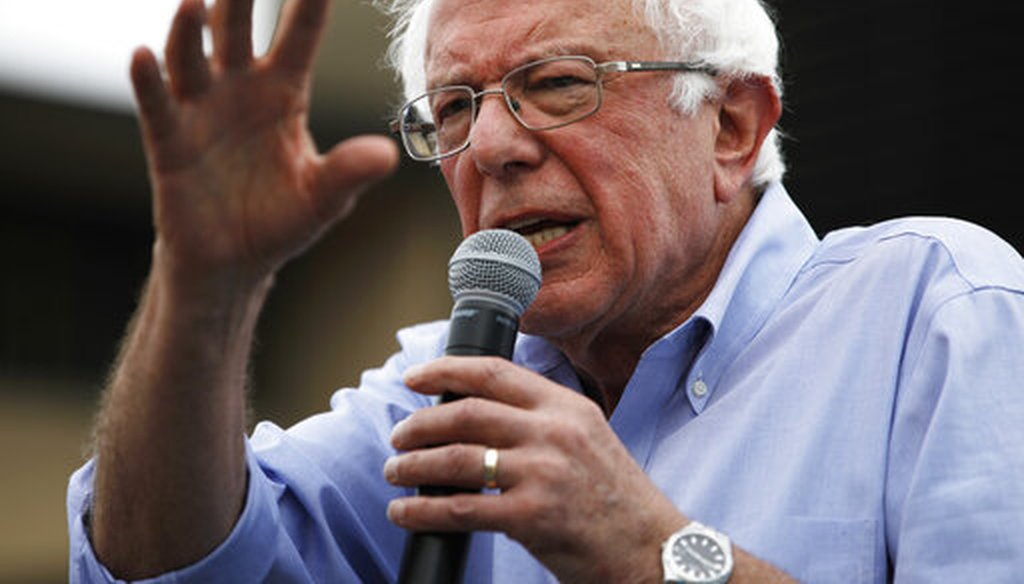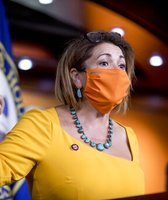Stand up for the facts!
Our only agenda is to publish the truth so you can be an informed participant in democracy.
We need your help.
I would like to contribute

Democratic presidential candidate Sen. Bernie Sanders, I-Vt., speaks at the Iowa State Fair in Des Moines Aug. 11, 2019. (AP)
Editor’s note: An earlier version of this story was published July 25, 2019.
Two events shifted the climate change discussion among 2020 Democratic presidential candidates in August 2019. Jay Inslee, the governor of Washington state who centered his campaign around the issue, dropped out of the race, while Vermont Sen. Bernie Sanders launched a detailed plan to fulfill the goals of the Green New Deal.
"The climate crisis is not only the single greatest challenge facing our country; it is also our single greatest opportunity to build a more just and equitable future," Sanders’ plan says.
Many candidates have plans, some lengthy and detailed, some brief and vague, to address climate change. Generally, the candidates support recommitting to the Paris climate agreement and implementing a Green New Deal, at least in some form. But there are some exceptions.
Former Maryland Rep. John Delaney, for example, tweeted that the current Green New Deal, which includes guaranteeing a job to all Americans, "is about as realistic as Trump saying that Mexico is going to pay for the wall."
That isn’t the only point of disagreement among candidates. The Democrats’ climate change proposals splinter in terms of how they plan to cut emissions, specifically whether or not they support implementing a tax on carbon.
As of this writing, candidates without specific or detailed climate change plans include New York Mayor Bill de Blasio and former U.S. Housing and Urban Development Department Secretary Julián Castro.
We’ll take you through some of the key points of the climate change discussion among the Democratic field. To see where the individual candidates stand on climate change policies, check out our chart.
Climate change is an expansive issue, encompassing increased temperature trends, sea level rise, ice mass loss, changes in plant blooming and extreme weather events. Global warming refers to the long-term warming of the Earth.
Burning fossil fuels, like coal, oil and natural gas, has been the main source of greenhouse gas emissions into Earth’s atmosphere. Without humans contributing these emissions, greenhouse gases, through the greenhouse effect, keep Earth’s surface warm. But the addition of emissions caused by human activities has led to a rise in global temperatures.
Carbon dioxide is the primary greenhouse gas emitted through human activities. U.S. greenhouse gas emissions originate mainly from transportation, electricity and industry.
"We can’t make climate change go away anytime soon, because the greenhouse gases we’ve already put into the atmosphere have not yet exerted their full impact on the climate system," said Jennifer Francis, a senior scientist at Woods Hole Research Center.
Countries all over the world took a dramatic step to address climate change in December 2015 with the United Nations Paris Agreement. The agreement is an attempt by most countries to limit a global temperature increase during this century to 1.5 degrees Celsius above pre-industrial levels.
Under the agreement, developed countries pledged to take the lead in reducing emissions and to support developing countries in similar actions. The United States is one of the top emitters of carbon dioxide from fossil fuel combustion, according to the International Energy Agency.
Former President Barack Obama championed the Paris Agreement. But President Donald Trump pledged to cancel it and announced his plans to pull the United States out of the agreement in 2017, claiming that it was unfair to U.S. workers. (In the past, Trump has denied that global warming is real.)
Some Democratic candidates have said they will make the goals of the Paris climate agreement more ambitious.
Former Vice President Joe Biden’s climate plan states that he’ll ramp up the targets of the agreement, make the commitments more transparent and enforceable, and, more broadly, integrate climate change into his foreign policy strategy. That includes conditioning trade agreements on partners meeting targets for cutting emissions.
Massachusetts Sen. Elizabeth Warren proposed a plan to address climate change in her approach to national security. She wants the Pentagon to achieve net-zero carbon emissions for its non-combat bases and infrastructure by 2030.
Seven of 10 Democratic presidential candidates who are members of Congress co-signed the Green New Deal, a resolution that addresses climate change, pollution, and income and racial inequality. The Democratic measure was introduced by Rep. Alexandria Ocasio-Cortez of New York and Sen. Ed Markley of Massachusetts in February 2019.
The resolution cites the 2018 National Climate Assessment, produced by over 300 federal and non-federal experts, which says climate change has worsened and increased a variety of events across the United States, including wildfires in the Northwest, droughts in the Southwest, flooding in the Southeast, snow storms in the Northeast and heavy rains in the Midwest. Earth’s climate is changing faster than at any point in the history of modern civilization, it found.
The Green New Deal focuses on goals to combat climate change, rather than specific paths. It calls for a transition to a net-zero greenhouse gas emissions economy and an energy sector powered entirely by zero-emission sources.
The Democratic presidential candidates who co-sponsored the deal are Warren, New Jersey Sen. Cory Booker, New York California Sen. Kamala Harris, Minnesota Sen. Amy Klobuchar, Massachusetts Rep. Seth Moulton, and Bernie Sanders.
Warren wants to invest $2 trillion over 10 years in "green research, manufacturing, and exporting," with the goal to create jobs. She’s also proposed a ban on all new fossil fuel leases, including drilling offshore and on public lands.
Sanders’ 2020 Green New Deal plan promises to end unemployment by creating 20 million jobs in auto manufacturing, construction, energy efficiency retrofitting and other sectors to combat climate change. Sanders also plans to allocate $40 billion to a Climate Justice Resiliency Fund that provides communities of color, Native Americans, people with disabilities, children and the elderly with a fair transition to a greener economy.
Multiple candidates incorporated economic and racial justice into their climate change proposals through protecting public lands, addressing environmental and health threats, and creating jobs.
In October 2017, Booker introduced an environmental justice act in the Senate to, in part, require federal agencies to implement strategies that identify and address the human health or environmental effects of their programs and policies with respect to communities of color, indigenous communities and low-income communities. Harris, Sanders and Warren co-sponsored the bill, which was never passed.
Alvaro Palacios Casanova, a senior policy advocate at the Center on Race, Poverty and the Environment, told PolitiFact that coming up with solutions to benefit environmental and social justice causes is difficult due to the fossil fuel industry’s political influence.
As of Aug. 26, 2019, 20 Democratic presidential candidates signed a pledge to not take any contributions over $200 from oil, gas and coal industry executives, lobbyists and political action committees (PACs). Bullock and Delaney haven’t signed the pledge.
Various Democrats have incorporated putting a price on greenhouse gas emissions, typically through a tax, into their climate change plans. They include Biden, Delaney, South Bend, Ind. Mayor Pete Buttigieg, former Pennsylvania Rep. Joe Sestak, author and activist Marianne Williamson, and entrepreneur Andrew Yang.
In a January 2019 opinion piece, a bipartisan group of economists said that a carbon tax is the most cost-effective method to reduce emissions "at the scale and speed that is necessary."
But carbon taxes are not without controversy. Ten states have active carbon pricing programs, according to the Center for Climate and Energy Solutions, but voters have rejected carbon pricing initiatives in other states like Washington, where Inslee endorsed the program.
Some critics are concerned on the impact carbon pricing systems may have on low-income households; protests erupted in France after fuel tax hikes were put in place, and France later suspended the increases.
Tamra Gilbertson, a carbon pricing policy researcher at the Indigenous Environmental Network, is critical of a carbon tax and other carbon pricing systems because, if implemented, companies will continue to extract fossil fuels, she told PolitiFact. It’s better if the fuel stays in the ground.
But many countries have carbon pricing systems in place, including Canada and Mexico.
Kevin Trenberth, a senior scientist at the National Center for Atmospheric Research, told PolitiFact that climate change mitigation efforts need to be broad-based.
"A city by itself, or a state by itself or a small country like New Zealand can’t solve the problem or even necessarily do a carbon tax responsibly, unless everybody does it," Trenberth said.
Our Sources
The New York Times, For Clinton and Trump, There’s Little Debating a Climate Change Divide, Oct. 17, 2016
Tom Perez Medium article, Climate Change and the 2020 Debates, June 11, 2019
PolitiFact, 7 questions about the Green New Deal, Feb. 12, 2019
John Hickenlooper 2020, Climate Change, accessed July 18, 2019
YouTube, Democratic Debate: Jay Inslee Says ‘This Is a Climate Crisis, an Emergency, June 26, 2019
NASA, What’s in a name? Weather, global warming and climate change, accessed July 18, 2019
University Corporation for Atmospheric Research Center for Science Education, The Greenhouse Effect, accessed July 18, 2019
United States Environmental Protection Agency, Overview of Greenhouse Gases, accessed July 18, 2019
United States Environmental Protection Agency, Sources of Greenhouse Gas Emissions, accessed July 18, 2019
United Nations Framework Convention on Climate Change, The Paris Agreement, Oct. 22, 2018
International Energy Agency, CO2 emissions from fuel combustion, 2018
The European Council, Paris Agreement on climate change, accessed July 18, 2019
Tweet by Donald Trump, Nov. 6, 2012
The White House, Statement by President Trump on the Paris Climate Accord, June 1, 2017
Medium, Our military can help lead the fight in combating climate change, May 15, 2019
United Nations Intergovernmental Panel on Climate Change, Global Warming of 1.5 ºC, Oct. 7, 2018
Congress.gov, H. RES. 109, Feb. 7, 2019
PolitiFact, 7 questions about the Green New Deal, Feb. 12, 2019
U.S. Global Change Research Program, Climate Assessment, Nov. 23, 2018
Jay Inslee, America’s Climate Mission, accessed July 18, 2019
Medium, My Green Manufacturing Plan for America, June 4, 2019
Medium, My plan for public lands, April 15, 2019
Congress.gov, S.1996 - Environmental Justice Act of 2017, Oct. 24, 2017
No Fossil Fuel Money Pledge, Presidential Candidate Signers, accessed July 18, 2019
The Wall Street Journal, Economists’ Statement on Carbon Dividends, Jan. 16, 2019
Center for Climate and Energy Solutions, U.S. State Carbon Pricing Policies, June 2019
The Seattle Times, Washington state voters reject carbon-fee initiative, Nov. 6, 2018
The New York Times, Macron Inspects Damage After ‘Yellow Vest’ Protests as France Weighs State of Emergency, Dec. 1, 2018
The New York Times, These Countries Have Prices on Carbon. Are They Working?, April 2, 2019
Indigenous Environmental Network, Indegenous Principles of Just Transition, accessed July 18, 2019
Reuters, Trump advisors aim to privatize oil-rich Indian reservations, Dec. 5, 2016
Union of Concerned Scientists, Carbon Pricing 101, accessed July 18, 2019
Brookings Institution, Leading carbon price proposals: A bipartisan dialogue, June 20, 2019
Congress.gov, S.3791 - Energy Innovation and Carbon Dividend Act of 2018, Dec. 19, 2018
Congress.gov, H.R. 763 - Energy Innovation and Carbon Dividend Act of 2019, Jan. 24, 2019
John Delaney for President, John Delaney’s Plan For Climate Change, accessed July 18, 2019
Michael Bennet for America, America’s Climate Change Plan, accessed July 18, 2019
Joe Biden for President, Climate, accessed July 18, 2019
Cory Booker, Climate Change and Environmental Justice, accessed July 18, 2019
Pete for America, Climate Change, accessed July 18, 2019
Kirsten Gillibrand 2020, Protecting our planet, accessed July 18, 2019
Kamala Harris For The People, Combat The Climate Crisis, accessed July 18, 2019
Jay Inslee, 100% Clean Energy for America, accessed July 18, 2019
Jay Inslee, An Evergreen Economy for America, accessed July 18, 2019
Jay Inslee, A Call to Action for a Climate Conservation Corps, accessed July 18, 2019
Jay Inslee, Global Climate Mobilization, accessed July 18, 2019
Jay Inslee, Freedom from Fossil Fuels, accessed July 18, 2019
Amy Klobuchar for President, Climate, accessed July 18, 2019
Wayne Messam, Climate Change, accessed July 18, 2019
Seth Moulton for America, Climate Change, accessed July 18, 2019
Beto O’Rourke, Climate Change, accessed July 18, 2019
Tim Ryan for America, Issues, accessed July 18, 2019
Bernie Sanders, Combat Climate Change and Pass a Green New Deal, accessed July 18, 2019
Joe Sestak for President, Climate Change & Environmental Protection, accessed July 18, 2019
Medium, Accelerating the Transition to Clean Energy, July 10, 2019
Marianne Williamson for President, Climate Crisis, accessed July 18, 2019
Yang2020, Combat Climate Change, accessed July 18, 2019
Phone interview with Adele Morris, senior fellow at the Brookings Institution, July 1, 2019
Phone interview with Alvaro Palacios Casanova, senior policy advocate at the Center on Race, Poverty and the Environment, July 17, 2019
Phone interview with Jennifer Francis, senior scientist at Woods Hole Research Center, July 16, 2019
Phone interview with Kevin Trenberth, senior scientist at the National Center for Atmospheric Research, July 1, 2019
Phone interview with Tamra Gilbertson, carbon pricing policy researcher at the Indigenous Environmental Network, July 3, 2019
Bernie Sanders, The Green New Deal, accessed Aug. 26, 2019
Bullock 2020, Tackling the Climate Crisis, accessed Aug. 26, 2019
Tweet by John Delaney, Feb. 14, 2019






























